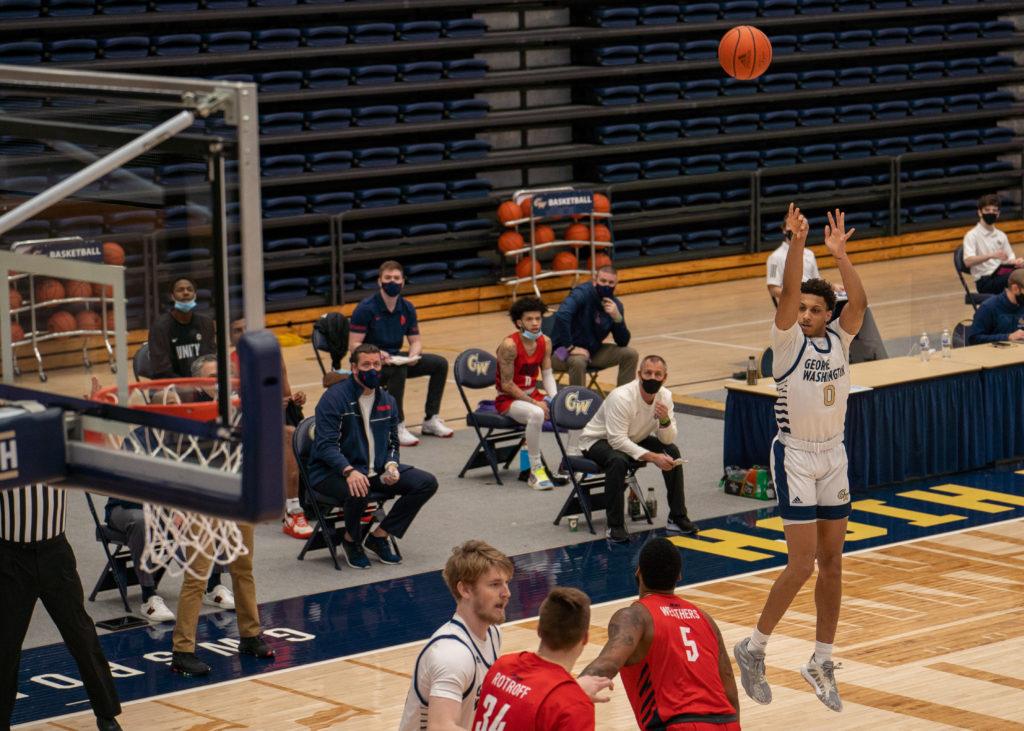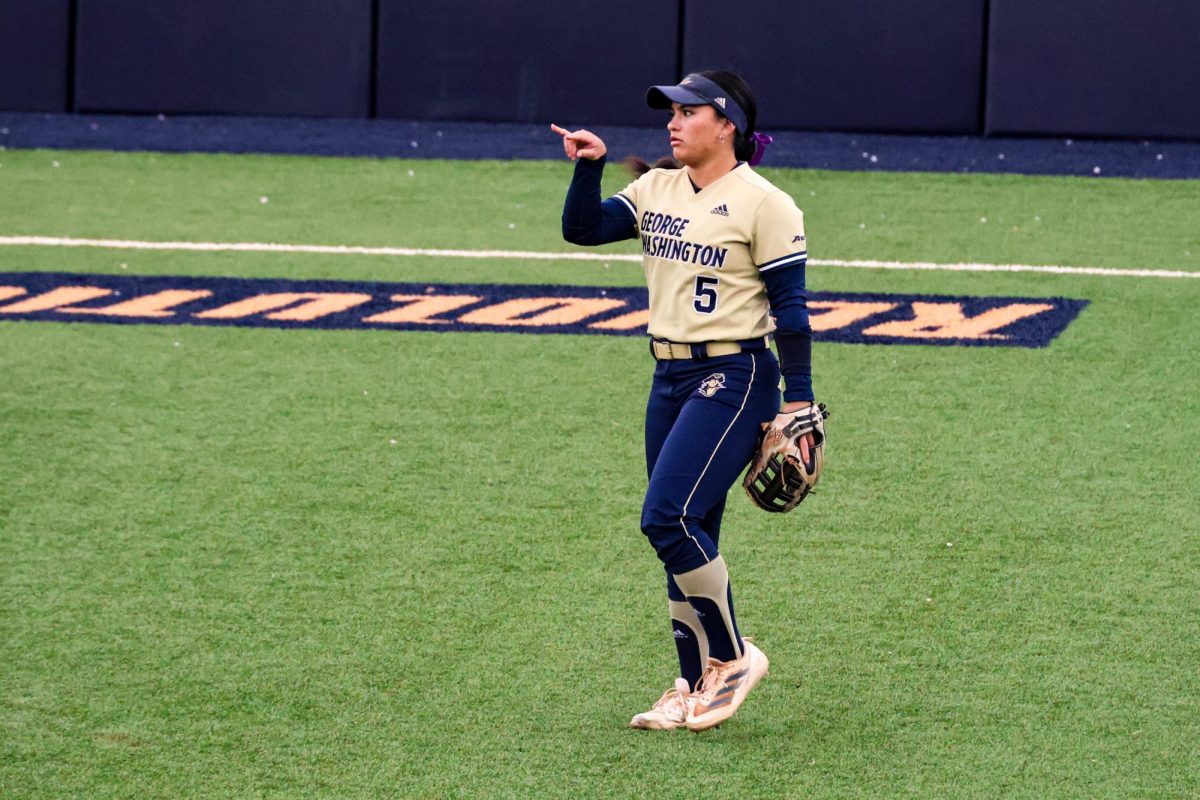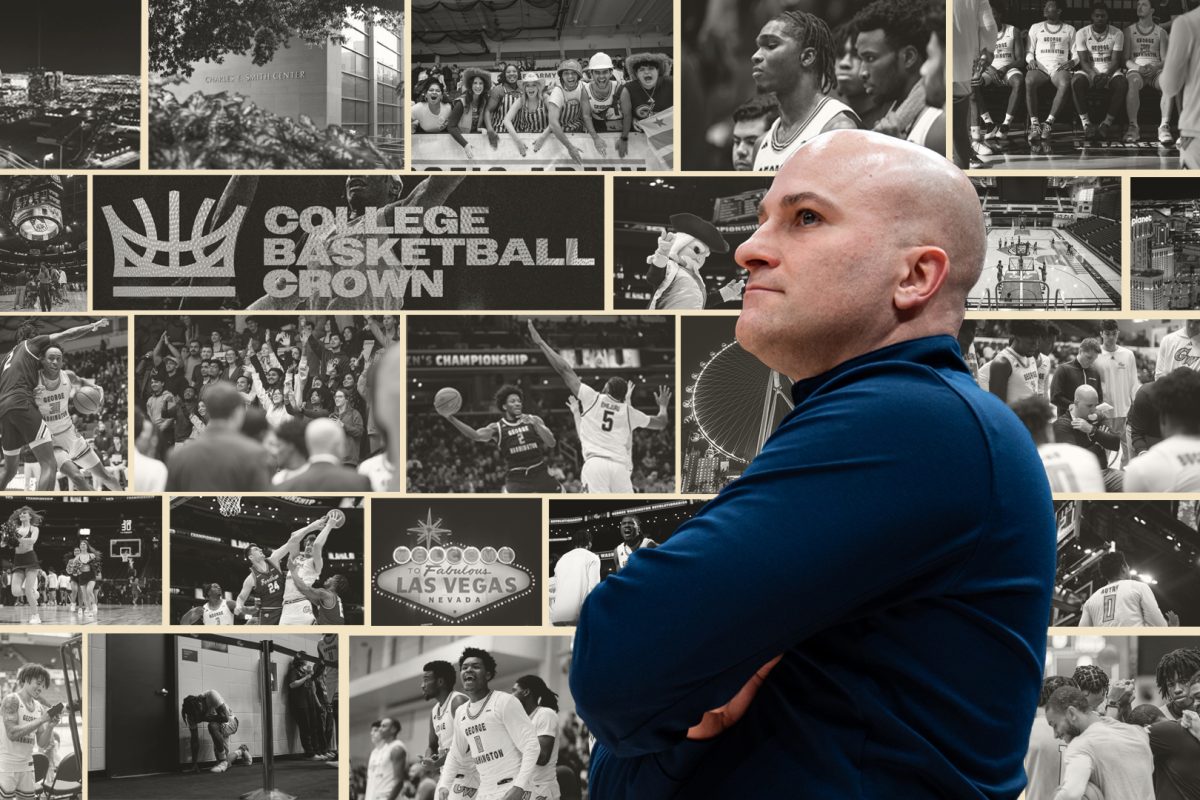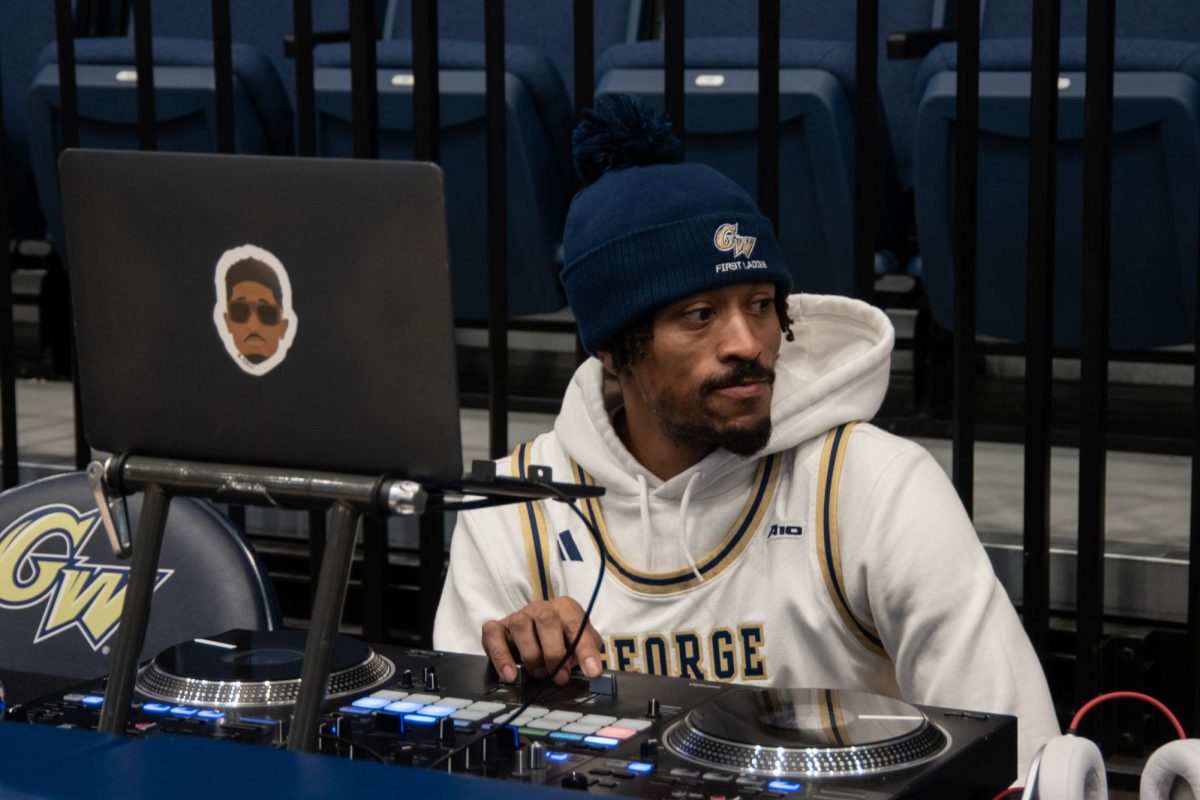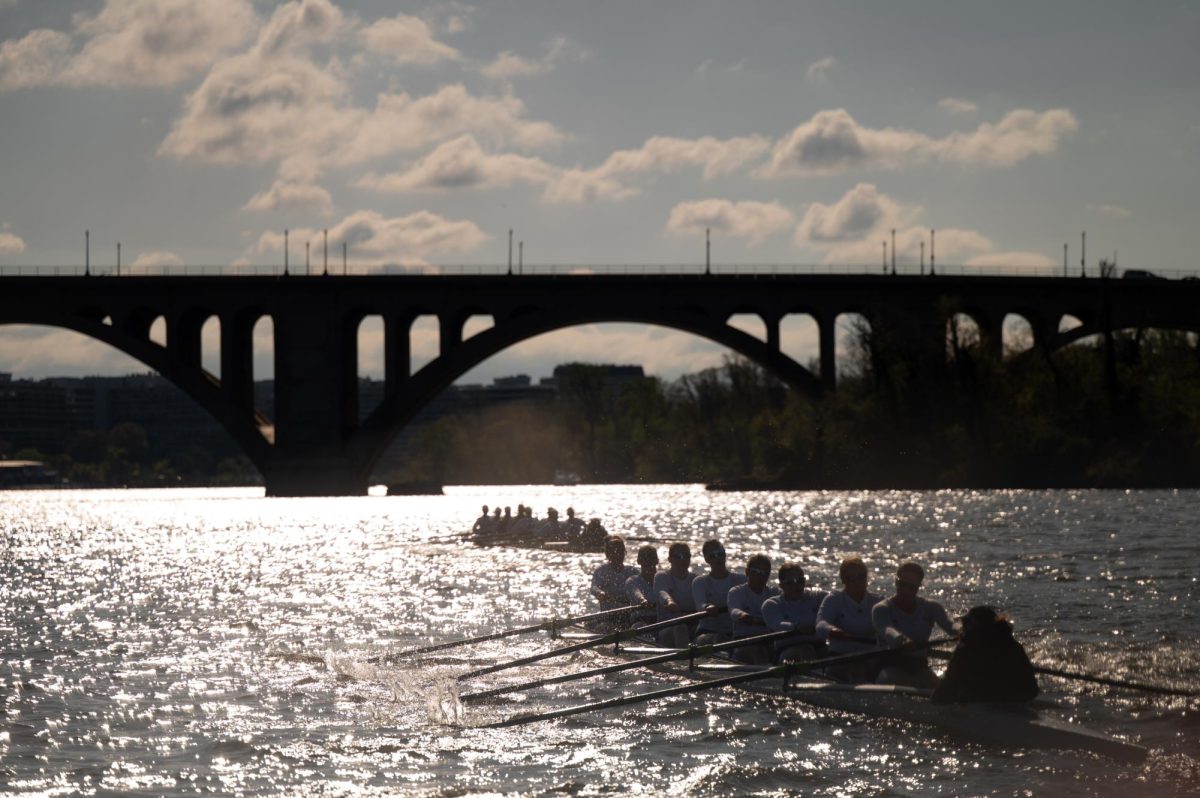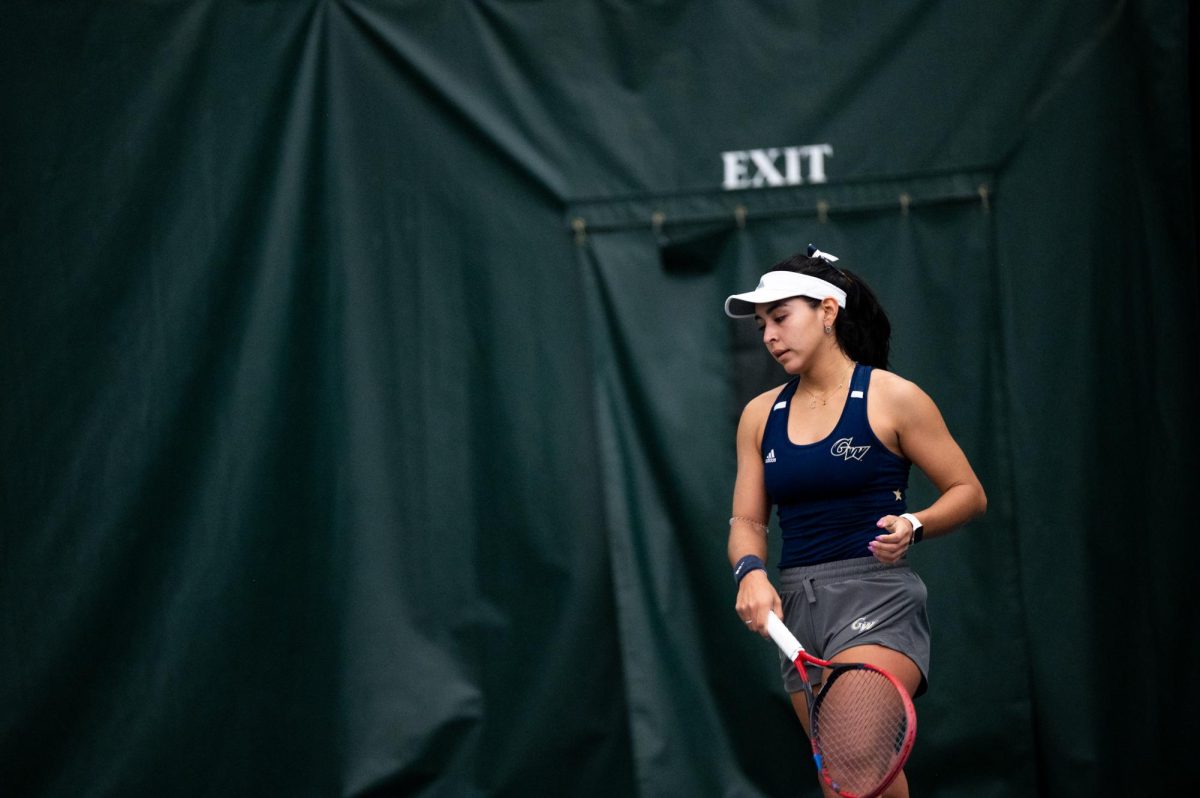In a season plagued by a revolving door of personnel changes, canceled games and COVID-19 pauses, head coach Jamion Christian can now turn his attention to rebuilding a depleted roster.
Seven players left the program, 10 games were postponed and eventually canceled and two COVID-19 pauses lasted a combined 37 days. Christian said his team fought through the adversity of a season during the pandemic, while he and his coaching staff worked around all of the challenges thrown at them.
“It’s almost like that was the constant theme – your ability to have agility and to pivot and adjust,” Christian said. “That was just a really challenging part of how we do a full evaluation, because nothing was the same as years before and nothing will be the same as this for years after.”
The Colonials normally returned to Foggy Bottom after a brief summer break in June or July to begin gelling as a team and practicing, but Christian said his squad wasn’t on campus and the hardwood together until early September.
With seven new additions to the squad, Christian said he had to begin game preparations for a Nov. 25 season start without allowing his team time to mesh personalities and develop habits together.
“We were the last in the A-10, I believe, to have our team back,” he said. “So we basically went right into game preparation in preparing to play, and then we didn’t even have scrimmage games this year. So we worked quickly to try to prepare to play.”
GW began the season on a low note, dropping six of its first seven games. The team’s zone defense allowed opponents to put up 77.1 points a game during that time frame. Christian said the zone was not executed “very well.”
“We thought the strategy was sound, the personnel that we had, the size that we had, and the ability to be able to do that really would have been beneficial to us,” he said. “We just weren’t able to execute it well enough to the degree we needed to. I did feel like we did grow defensively as the year went on, just the ability to switch and to make it tougher for a team to score.”
The squad rolled into A-10 play down three players, after senior guard Maceo Jack, senior forward Ace Stallings and sophomore guard Jameer Nelson Jr. left the team in December. GW was not deterred by the thinning roster, kicking off A-10 play with a 2-1 record after knocking off Fordham and Duquesne.
“I did feel like we were starting to play pretty good basketball,” Christian said. “We were kind of starting to get into game shape and into practice shape, and I think we all felt here that we were about to turn a corner after that win versus Duquesne.”
But the team missed two consecutive games due to the insurrection at the U.S. Capitol and a positive COVID-19 test among a Tier 1 staff member. Once the team returned to practice, sophomore forward Jamison Battle, the team’s second-leading scorer, suffered a concussion.
The NCAA then granted all transfers the ability to play immediately. Maryland transfer junior forward Ricky Lindo Jr. initially planned to sit out the full 2020-21 season to work on his game, a decision Christian said he and his staff supported. But with the added year of eligibility, Christian said he gave Lindo Jr. time to get comfortable enough to play.
When the team returned to play against VCU Jan. 13, Lindo Jr. made waves in his first game as a Colonial with 13 points, 12 rebounds and five steals.
He saw time in the team’s next matchup against Dayton Jan. 17 before the squad embarked on a 35-day COVID-19 pause that saw “just under half” of the team contract COVID-19, Christian said.
“We just had so many guys that contracted COVID, and it scared the guys,” Christian said. “The guys were scared about catching it. It’s hard to play basketball if you don’t want to make contact. It was such a different situation for the guys to handle. I don’t know if anyone was really prepared for the whole extent of it.”
Christian announced Jan. 19 that he tested positive for COVID-19, and he added that some symptoms still linger today. He said despite his battles with the virus, his players were his first concern.
“I wanted to be there for and be strong for the guys,” he said. “And to have enough empathy for them and understand that they don’t have to be 100 percent on the day we have our first game, 100 percent 20 days after that.”
He said the squad followed the team doctor’s instructions, but different players had different symptoms, which increased the challenge of taking care of the team. Christian added that he and his staff focused on making the players feel “loved and cared for” as the pause wore on.
“It was a really tough year, I think all our guys felt loved and cared for,” he said. “That was a positive.”
As players began to clear the 10-day COVID-19 quarantine and seven-day return to play protocol, a semblance of practice could return, but Christian said his team was never the same after its pause.
“You’re not at 100 percent,” he said. “You’re out there giving everything you’ve got for your team and for GW, but you’re not at 100 percent. You don’t feel the same, you’re working through that stuff. I do think that was a pretty big challenge.”
Down three more players as junior forward Sloan Seymour opted out and forwards graduate student Matt Moyer and sophomore Chase Paar sidelined, GW downed Rhode Island in its first game back. The squad dropped its last two games of the regular season.
The Colonials ended their season in the second round of the A-10 tournament. Within two weeks, Battle, Paar, Seymour and freshman guard Lincoln Ball entered the transfer portal. Christian said Moyer signed with an agent with the intent to play professional basketball and graduate student guard Brandon Leftwich is still undecided if he will use his extra year of eligibility, leaving just assured returners.
Now, Christian said he is turning his attention to developing a “bigger, faster, more aggressive team” that plays “as a brotherhood.” He added that his team will get together around the end of May to begin practicing for the 2021-22 season.
“They have to be better physically and mentally, be it inside the game and outside the game, understanding what we need to do to be a better program,” he said. “Our job as the leadership is to help them see the vision and continue to build them a plan where they can continue to improve on that plan.”


